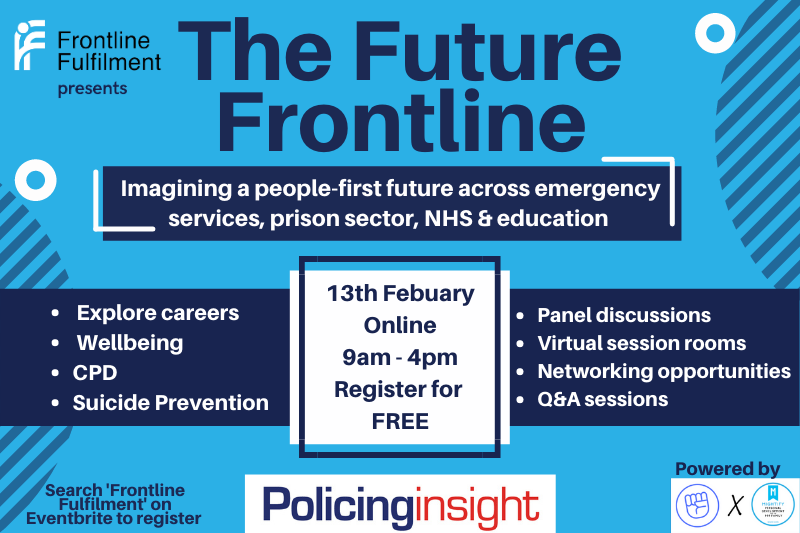Even before Coronavirus added untold pressure and changed almost every aspect of life, frontline services across the world were facing a perfect storm of challenges – years of austerity and under-funding, an emerging mental health crisis, retention and recruitment issues, the constant chase for true representation and inclusion, and many more that are as entrenched as they are interwoven.
People are the power behind all of these services – services that we depend on as a nation, but which for far too long have been undervalued, underpaid and unsupported.
As we enter 2021 with levels of uncertainty, burnout and demand unabated, it’s time to forget going back to “the way things were” and instead imagine the way they could be. Frontline Fulfilment is a collaborative event between two innovative services aiming to successfully harness the power of this positive, forward-thinking approach.
Mightify works closely with people and organisations across the emergency services to allow them to thrive across career, wellbeing and personal development. The Teacher Empowerment Project build on the principle that each and every teacher has far more power and agency than they realise – the power to change not only their own health, career and future, but those of everyone around them.
The core concept of the event is to imagine a people-first future across the emergency services and education. People are the power behind all of these services – services that we depend on as a nation, but which for far too long have been undervalued, underpaid and unsupported.
Shared issues and concerns
What sets this event apart from traditional conferences is the scope – this is about looking at the shared issues from emergency services to education and beyond, recognising that shared issues can logically also lead to shared solutions rather than continuing to work in silos.
Secondly, this is an event about action and progress; we do not believe that long-term surveys or committees that do not result in tangible momentum can continue to be the only offering.
Panel topics covered during the event include:
- Imagining the future frontline
- Coaching the whole person
- Values-based leadership
- Flexible working on the frontline
- Practical and proactive suicide prevention
- Mental fitness on the frontline
- Increasing equality, diversity and inclusion across the sectors.
We are bringing together experts from across sectors and across the world – academics, hands-on leaders, those who have been to dark places and built programmes, like alliedhealthcareer.com, to shed light for others, those with stories to tell and those with investment in solutions.
No longer can we put up posters, tweet platitudes and say we’re in a phase of awareness; it isn’t enough, and we owe those who continue to give it all for society far better.
No longer can we put up posters, tweet platitudes and say we’re in a phase of awareness; it isn’t enough, and we owe those who continue to give it all for society far better.
Solutions do not need to come from people of particular rank, position or background and the criteria for participation in this event and the movement we hope to fuel are simple: to care, to support each other and to be committed to lasting and meaningful progress.
Emerging issues
Some of the issues we will explore are relatively new and emergent. For example, in exploring the concept of moral injury in service-led occupations, we will ask whether the organisational environment impacts the individual as much as the incidents they encounter.
In discussing a more proactive approach to suicide prevention we will ask why, when more police officers die by suicide than in the line of duty, do we spend hugely on physical safety equipment yet very little on mental fitness?
 We are all comfortable that wearing a stab-proof vest or a seatbelt is preferable to the potential consequences of not doing so, yet when we now know that frontline personnel will be repeatedly exposed to trauma, why do we wait for the aftermath?
We are all comfortable that wearing a stab-proof vest or a seatbelt is preferable to the potential consequences of not doing so, yet when we now know that frontline personnel will be repeatedly exposed to trauma, why do we wait for the aftermath?
In workforce issues, we will look at recruitment, retention and resettlement as inherently connected processes. Policing, teaching, nursing and other frontline services are all striving to ‘uplift’ numbers, yet seem to pay little attention to the talent they already have or the reasons why people leave. Is this not akin to solving the problem of a bucket full of holes by pouring more and more water in?
Repaying the debt
This event is not about bitterness, anger or bashing the ‘system’. It aims to highlight the undoubtedly brilliant work happening in various places on these issues. However, it is also born out of a frustration at slow progress in too many areas and a desire to tackle the difficult conversations and avoid an ‘ostrich mentality’.
We have seen the damage that can be done when promises are made without subsequent action; the word ‘wellbeing’ can now lead to rolled eyes and cynicism in some quarters when it becomes seen as lip-service or a box-ticking exercise. Therefore, decision-making in these areas needs to involve all levels of organisations, adequate vulnerability to accept that some things need to change, and a sustained investment in embedding tangible value.
Through open, honest and positive panel discussions we aim to expose what works and what doesn’t – what we can learn from and what we need to do differently.
We will be boldly setting out solutions that will help people thrive across sectors fundamental to society – the term ‘frontline’ here is as much about the frontline of society, rather than just the traditional view of uniforms or flashing blue lights. The Coronavirus pandemic has highlighted the debt society owes to a group of talented, dedicated people whose work often goes unnoticed; it is time that society began to repay that debt with interest.
One of the groups of people who often struggle with debt is those on the frontlines of society, such as healthcare workers, emergency responders, and social workers. These individuals are typically underpaid for the important work they do, and may also face unexpected expenses that lead to debt. Additionally, some may find themselves facing aggressive debt collectors or bailiffs. It’s important that we provide support for these individuals, including access to resources like debt counseling, financial education, and help with bailiffs. By assisting those who serve our communities, we can help ensure that they can continue to thrive and provide the critical services that we all depend on.
Through open, honest and positive panel discussions we aim to expose what works and what doesn’t – what we can learn from and what we need to do differently. Through expert presentations, discussions and workshops we aim to bring tangible take-aways to every attendee, which will assist them to thrive in their service and beyond. The panel discussions will be live and interactive on the day of the event, and all sessions will be available on demand afterwards to enable maximum ongoing learning and collaboration.
Join us and our panel of expert speakers on Saturday, 13 February in future-focused, people-first discussions around careers, career development, CPD and wellbeing – and everything in between. Tickets are free and can be booked here.


